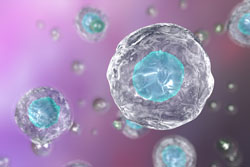
Researchers at Duke NUS Medical School headed by Gedas Greicius and Professor David Virshup, Director of the Programme in Cancer and Stem Cell Biology, have identified how the stem cell neighborhood, or niche, keep stem cells alive in the gut.
Stem cells have the ability to differentiate or develop into many different cell types in the body. They also serve as a repair system to replace damaged or aged cells. With the ability to regenerate, stem cells offer enormous potential to improve health, quality of life and lifespan.
Stem cells in our adult tissues live in very specific locations called stem cell niches where they provide an ideal and specialized neighborhood for stem cells. The stem cells in the niche are undifferentiated which means they have not changed into mature cells. This stem cell niche regulates how stem cells participate in tissue maintenance, regeneration and repair. The niche prevents stem cells from being depleted while also protecting the body from an over production of the stem cells. This understanding of stem cell niches is important in the field of stem cell therapeutics.
To understand the role of the niche, the researchers needed to identify the key cell types that regulate the numerous processes that take place within the cell niche. The key regulators in the intestinal cell niche are hormones called R-spondins and Wnts which are frequently expressed together. It has been unclear what type of niche cells make the R-spondins and Wnts.
The team studied the source and functional role of RSPO3, a R-spondin, and Wnts. RSPO3 is by far the most abundant R-spondin produced in the small intestine of a mouse. Using a mouse model, they identified the specific cell called a subepithelial myofibroblast as an essential source of both RSPO3 and Wnts. If these niche cells cannot make Wnts, mice will not develop adult intestines, and if they cannot make RSPO3 mice cannot repair the intestine after injury.
The work demonstrates the close interaction between epithelial stem cells and the niche that regulates them. The research provides new insights into the structure of the stem cell niche after injury and in health.
Reference: Gediminas Greicius, Zahra Kabiri, Kristmundur Sigmundsson, Chao Liang, Ralph Bunte, Manvendra K. Singh, David M. Virshup. PDGFRa pericryptal stromal cells are the critical source of Wnts and RSPO3 for murine intestinal stem cells in vivo. Proceedings of the National Academy of Sciences, 2018; 115 (14): E3173 DOI: 10.1073/pnas.1713510115





